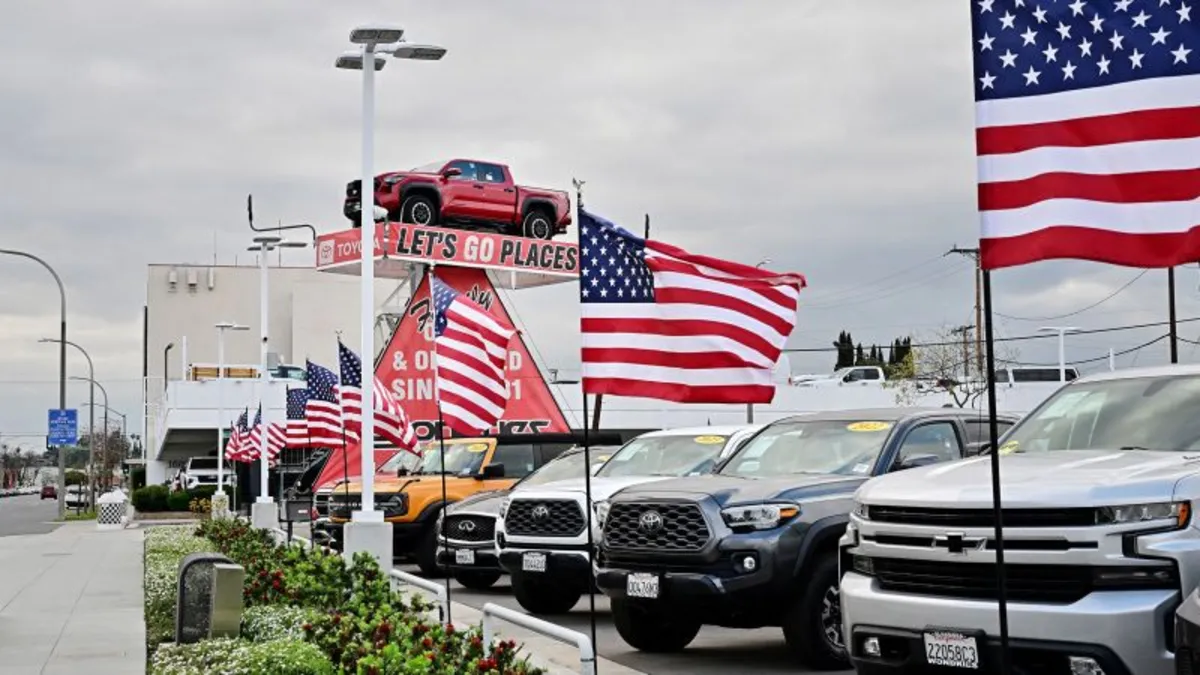
Auto dealerships across the United States are bracing for a surge in customer traffic this week as cost-conscious buyers scramble to avoid potential price hikes and rising maintenance costs in the coming years. Industry analysts attribute this growing concern to President Donald Trump’s impending 25% tariffs on imported vehicles and parts, which are set to take effect this Thursday. These tariffs are expected to significantly impact the cost of cars manufactured in American factories, leading to price increases of thousands of dollars.
The reality is that there is no such thing as an entirely American-made car. Last year, all 10.2 million vehicles produced in U.S. factories utilized a substantial number of imported parts, primarily sourced from Canada and Mexico. Consequently, the impending tariffs will not only affect imports but also raise the prices of domestically assembled vehicles, such as those from Ford, Chrysler, GM, and Honda. According to a February estimate from the Michigan-based think tank Anderson Economic Group, the cost of a car assembled in North America could increase between $4,000 and $10,000. Electric vehicles could see an even steeper rise, with costs projected to increase by at least $12,000.
Consumers like Miguel Colom from Bethlehem, Pennsylvania, are feeling the pressure to make quick purchasing decisions before the tariffs take effect. Colom, who plans to buy a Chevy Equinox EV, expressed concern over the potential $12,500 price increase that could eliminate the vehicle from their budget. "A $12,500 price increase on the vehicle we chose would effectively remove it from consideration," he stated in an email to CNN. He further added that even a modest price increase would make them hesitant to buy a new car.
While the rising prices of new vehicles are a primary concern, many Americans are also worried about the rising maintenance costs for older car models. Robert Wyatt from New Jersey recently traded in his 9-year-old Mercedes GLE-350 for a new Toyota, noting that he expedited his purchase due to the uncertain future of car prices driven by the tariffs. "Things start breaking," he explained, emphasizing his fear of maintenance costs associated with an aging vehicle.
Sales managers are noting an uptick in inquiries, although a significant surge in sales has yet to materialize. Tom Tatich, the general manager at a Toyota dealership in Marysville, Washington, remarked that customers are increasingly anxious about future car prices. He pointed out that high demand and limited supply have been persistent issues for Toyota, and he expects demand to remain strong once the tariffs are implemented. Many customers are attempting to lock in prices for vehicles that have yet to arrive at the dealership.
The uncertainty surrounding Trump’s tariff policies continues to loom large. In a recent interview, Trump indicated that he supports price increases on foreign cars, suggesting that higher prices could lead consumers to opt for American-made vehicles. However, the looming tariffs have prompted automakers to consider cutting back on production until there is clarity on whether the tariffs will be enforced.
If the tariffs remain in place, dealerships are likely to raise their prices in response to decreased inventory. Doug Schoepp, the owner of Schoepp Motors in Wisconsin, mentioned that his dealership currently has around 500 cars available, which he expects will last for only two to three months. He expressed uncertainty about whether Trump’s tariff policies would be confirmed or if there would be any changes before they take effect. "If tariffs remain, everyone will pay more," Schoepp warned, adding that new car prices could rise by as much as 25%, while used cars could see a minimum increase of 10%.
As the market braces for potential upheaval, both consumers and dealerships are navigating a landscape marked by uncertainty and rising costs. The implications of these tariffs could reshape the auto industry and how Americans approach their vehicle purchases in the near future.